Michael B. Jordan Tells Chadwick Boseman “I Wish We Had More Time” & Reflects On One Of Their Final Conversations
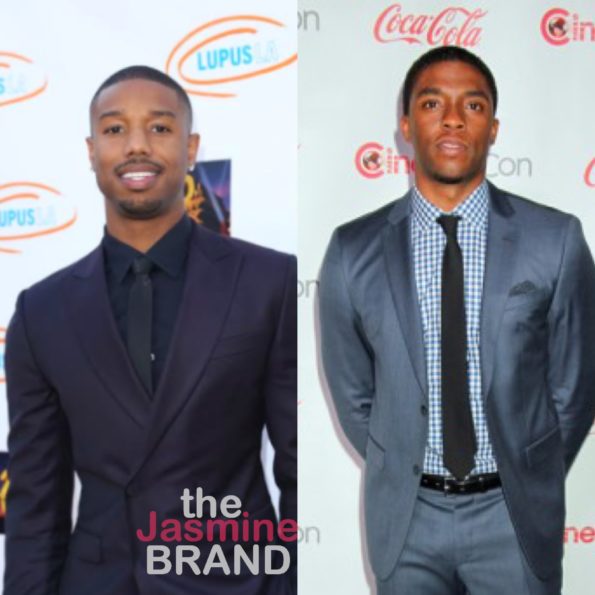
Michael B. Jordan Tells Chadwick Boseman “I Wish We Had More Time”, Reflects On One Of Their Final Conversations
Update #1. Michael B. Jordan has broken his silence, about the sad passing over his friend and fellow actor Chadwick Boseman. In part of his lengthy tribute, Michael B. Jordan writes:
I’ve been trying to find the words, but nothing comes close to how I feel. I’ve been reflecting on every moment, every conversation, every laugh, every disagreement, every hug…everything.
I wish we had more time.
He continues his message, reflecting on the last time that the spoke.
One of the last times we spoke, you said we were forever linked , and now the truth of that means more to me than ever. Since nearly the beginning of my career, starting with All My Children when I was 16 years old you paved the way for me. You showed me how to be better, honor purpose, and create legacy. And whether you’ve known it or not…I’ve been watching, learning and constantly motivated by your greatness.
I wish we had more time.
See the complete message below.
Original story: The world continues to mourn the sudden death of actor and activist, Chadwick Boseman, after he succumbed to colon cancer on August 28th. Celebrities, parents, and even children have expressed their great sorrow in losing a Black superhero, both on television and in real life.
Chadwick Boseman’s good friend and fellow co-star in Marvel’s Black Panther, Michael B. Jordan, has not yet made a public statement about losing his friend, but according to a close source, the actor is ‘struggling’ to come to terms with his loss.
![Kendrick Lamar Producing 'Black Panther' Soundtrack, Releases First Single w/SZA [New Music]](https://thejasminebrand.com/wp-content/uploads/2017/11/black-panther-marvel-chadwick-boseman.jpg)
Michael B. Jordan is reportedly ‘beyond sad’ and was ‘rocked’ by the news of his friend’s passing. According to the source, Jordan’s “silence is his pain”.
Both actors, who reportedly became more like brothers than friends, gained a bond on the set of Black Panther that garnered a global success, earning an astonishing $1.3 billion, worldwide.
Other castmates of Black Panther have spoken out regarding the loss of Boseman, including Danai Gurira, Letitia Wright, and Winston Duke.
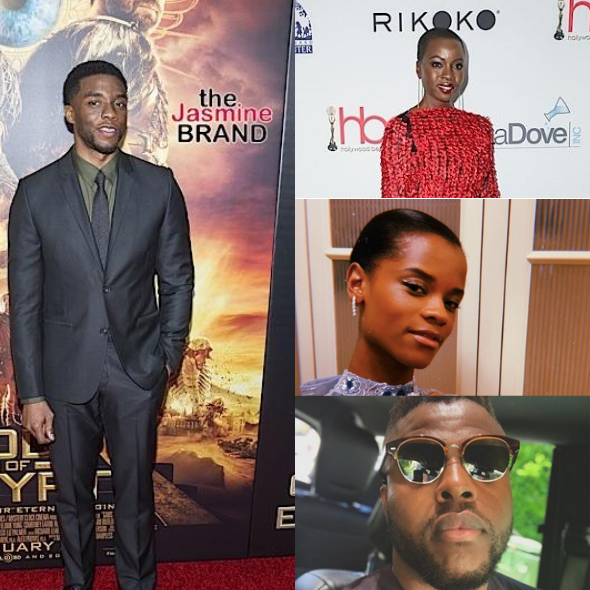
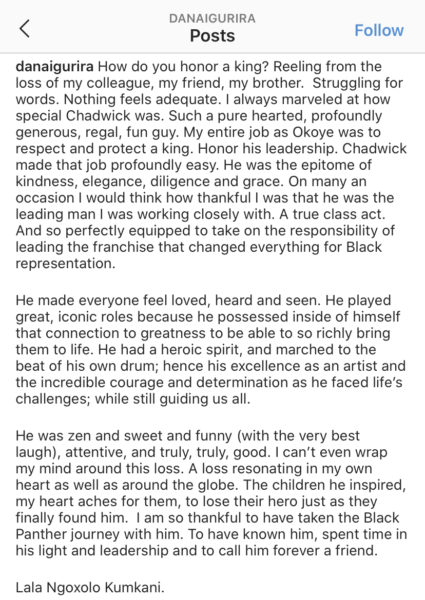

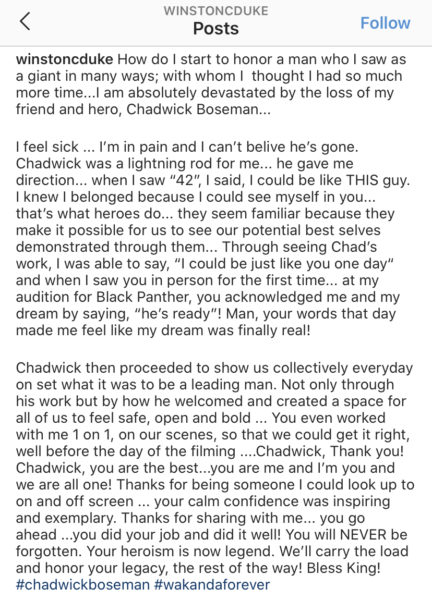
In an emotional, lengthy, heartfelt tribute, Ryan Coogler (Director of Black Panther and friend of Boseman) expressed,
I inherited Marvel and the Russo Brothers’ casting choice of T’Challa. It is something that I will forever be grateful for. The first time I saw Chad’s performance as T’Challa, it was in an unfinished cut of CAPTAIN AMERICA: CIVIL WAR. I was deciding whether or not directing BLACK PANTHER was the right choice for me. I’ll never forget, sitting in an editorial suite on the Disney Lot and watching his scenes. His first with Scarlett Johansson as Black Widow, then, with the South African cinema titan, John Kani as T’Challa’s father, King T’Chaka. It was at that moment I knew I wanted to make this movie. After Scarlett’s character leaves them, Chad and John began conversing in a language I had never heard before. It sounded familiar, full of the same clicks and smacks that young black children would make in the States. The same clicks that we would often be chided for being disrespectful or improper. But, it had a musicality to it that felt ancient, powerful, and African.
In my meeting after watching the film, I asked Nate Moore, one of the producers of the film, about the language. “Did you guys make it up?” Nate replied, “that’s Xhosa, John Kani’s native language. He and Chad decided to do the scene like that on set, and we rolled with it.” I thought to myself. “He just learned lines in another language, that day?” I couldn’t conceive how difficult that must have been, and even though I hadn’t met Chad, I was already in awe of his capacity as actor.
Ryan Coogler continued on,
I learned later that there was much conversation over how T’Challa would sound in the film. The decision to have Xhosa be the official language of Wakanda was solidified by Chad, a native of South Carolina, because he was able to learn his lines in Xhosa, there on the spot. He also advocated for his character to speak with an African accent, so that he could present T’Challa to audiences as an African king, whose dialect had not been conquered by the West.
I finally met Chad in person in early 2016, once I signed onto the film. He snuck past journalists that were congregated for a press junket I was doing for CREED, and met with me in the green room. We talked about our lives, my time playing football in college, and his time at Howard studying to be a director, about our collective vision for T’Challa and Wakanda. We spoke about the irony of how his former Howard classmate Ta-Nehisi Coates was writing T’Challa’s current arc with Marvel Comics. And how Chad knew Howard student Prince Jones, who’s murder by a police officer inspired Coates’ memoir Between The World and Me.
I noticed then that Chad was an anomaly. He was calm. Assured. Constantly studying. But also kind, comforting, had the warmest laugh in the world, and eyes that seen much beyond his years, but could still sparkle like a child seeing something for the first time.
That was the first of many conversations. He was a special person. We would often speak about heritage and what it means to be African. When preparing for the film, he would ponder every decision, every choice, not just for how it would reflect on himself, but how those choices could reverberate. “They not ready for this, what we are doing…” “This is Star Wars, this is Lord of the Rings, but for us… and bigger!” He would say this to me while we were struggling to finish a dramatic scene, stretching into double overtime. Or while he was covered in body paint, doing his own stunts. Or crashing into frigid water, and foam landing pads. I would nod and smile, but I didn’t believe him. I had no idea if the film would work. I wasn’t sure I knew what I was doing. But I look back and realize that Chad knew something we all didn’t. He was playing the long game. All while putting in the work. And work he did.
He would come to auditions for supporting roles, which is not common for lead actors in big budget movies. He was there for several M’Baku auditions.
In Winston Duke’s, he turned a chemistry read into a wrestling match. Winston broke his bracelet.
In Letitia Wright’s audition for Shuri, she pierced his royal poise with her signature humor, and would bring about a smile to T’Challa’s face that was 100% Chad.
While filming the movie, we would meet at the office or at my rental home in Atlanta, to discuss lines and different ways to add depth to each scene. We talked costumes, military practices. He said to me “Wakandans have to dance during the coronations. If they just stand there with spears, what separates them from Romans?” In early drafts of the script. Eric Killmonger’s character would ask T’Challa to be buried in Wakanda. Chad challenged that and asked, what if Killmonger asked to be buried somewhere else?
Chad deeply valued his privacy, and I wasn’t privy to the details of his illness. After his family released their statement, I realized that he was living with his illness the entire time I knew him. Because he was a caretaker, a leader, and a man of faith, dignity and pride, he shielded his collaborators from his suffering. He lived a beautiful life. And he made great art. Day after day, year after year. That was who he was. He was an epic firework display. I will tell stories about being there for some of the brilliant sparks till the end of my days. What an incredible mark he’s left for us.
I haven’t grieved a loss this acute before. I spent the last year preparing, imagining and writing words for him to say, that we weren’t destined to see. It leaves me broken knowing that I won’t be able to watch another close-up of him in the monitor again or walk up to him and ask for another take.
It hurts more to know that we can’t have another conversation, or facetime, or text message exchange. He would send vegetarian recipes and eating regimens for my family and me to follow during the pandemic. He would check in on me and my loved ones, even as he dealt with the scourge of cancer.
He concluded,
In African cultures we often refer to loved ones that have passed on as ancestors. Sometimes you are genetically related. Sometimes you are not. I had the privilege of directing scenes of Chad’s character, T’Challa, communicating with the ancestors of Wakanda. We were in Atlanta, in an abandoned warehouse, with bluescreens, and massive movie lights, but Chad’s performance made it feel real. I think it was because from the time that I met him, the ancestors spoke through him. It’s no secret to me now how he was able to skillfully portray some of our most notable ones. I had no doubt that he would live on and continue to bless us with more. But it is with a heavy heart and a sense of deep gratitude to have ever been in his presence, that I have to reckon with the fact that Chad is an ancestor now. And I know that he will watch over us, until we meet again.
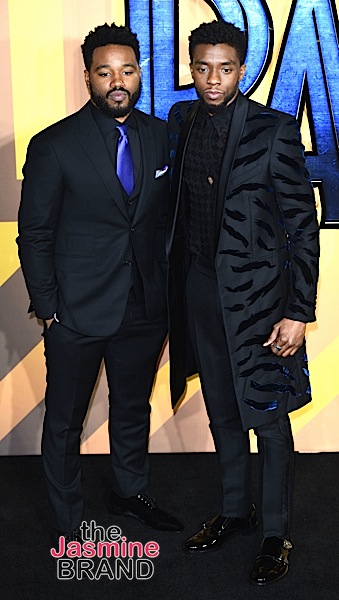
Ryan Coogler, Chadwick Boseman (2018)
We continue to keep the family and friends of Chadwick Boseman in prayer.


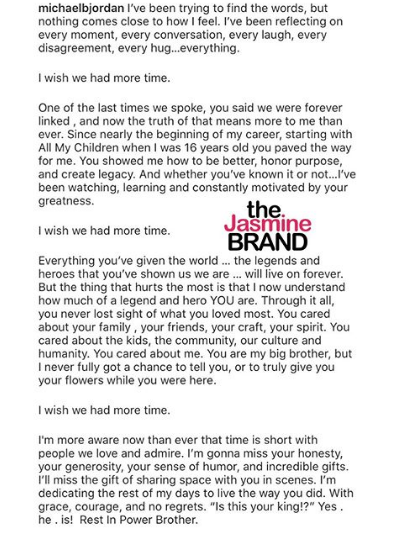
 Previous Article
Previous Article Next Article
Next Article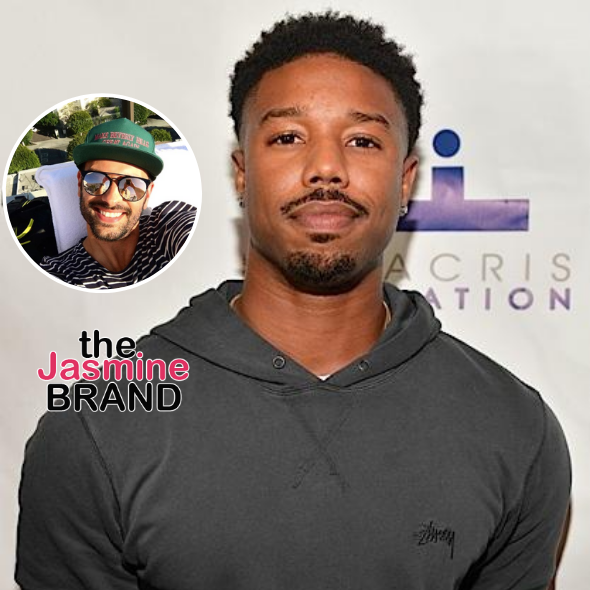 Michael B. Jordan’s Former House Assistant Claims Actor ‘Flirted’ W/ Him & Asked ‘Are We Gonna Kiss?’
Michael B. Jordan’s Former House Assistant Claims Actor ‘Flirted’ W/ Him & Asked ‘Are We Gonna Kiss?’ ![Comedian Cory Holcomb Claims Will Smith ‘Likes Guys’ [VIDEO]](https://thejasminebrand.com/wp-content/uploads/2025/04/IMG_7719-620x600.jpeg) Comedian Cory Holcomb Claims Will Smith ‘Likes Guys’ [VIDEO]
Comedian Cory Holcomb Claims Will Smith ‘Likes Guys’ [VIDEO] 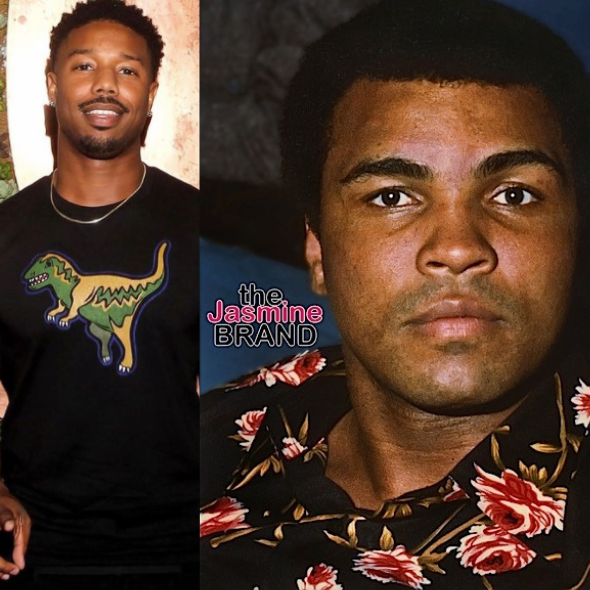 Michael B. Jordan Working On Muhammad Ali Series, Roc Nation To Executive Produce
Michael B. Jordan Working On Muhammad Ali Series, Roc Nation To Executive Produce 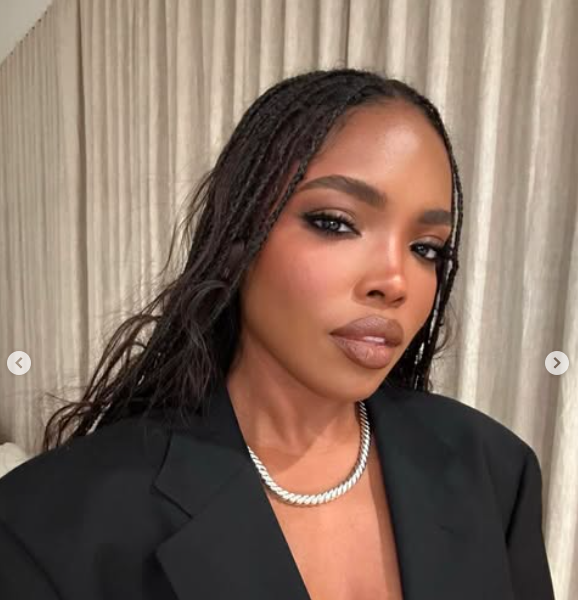 Ryan Destiny Says It Would Be ‘Incredible’ To Play Lauryn Hill In Biopic + Weighs In On ‘Star’ Movie Rumors
Ryan Destiny Says It Would Be ‘Incredible’ To Play Lauryn Hill In Biopic + Weighs In On ‘Star’ Movie Rumors 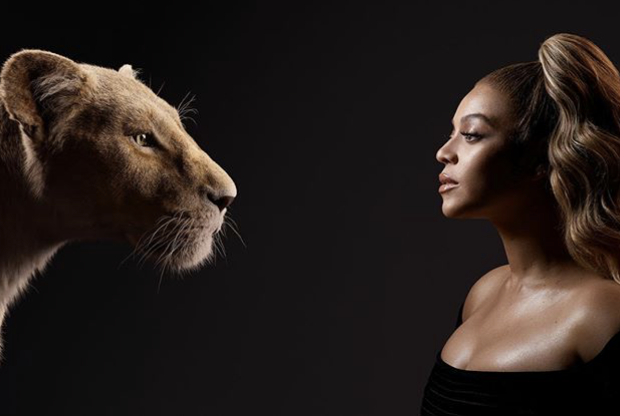 Beyonce Releases “Lion King” Promo Weeks Ahead of Premiere
Beyonce Releases “Lion King” Promo Weeks Ahead of Premiere 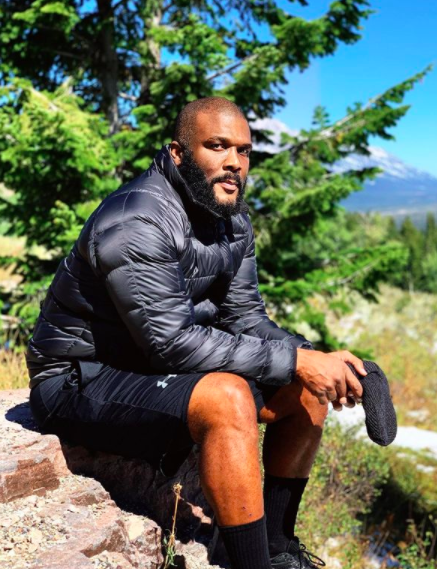 Tyler Perry To Get COVID-19 Vaccine On TV To Settle Doubt In Black Community, Asks Churches ‘What Good Are You?’
Tyler Perry To Get COVID-19 Vaccine On TV To Settle Doubt In Black Community, Asks Churches ‘What Good Are You?’ 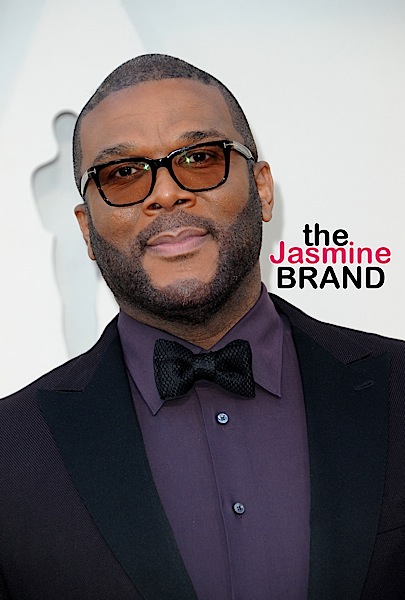 Tyler Perry Suggests He’s Hiring New Writers & Directors
Tyler Perry Suggests He’s Hiring New Writers & Directors 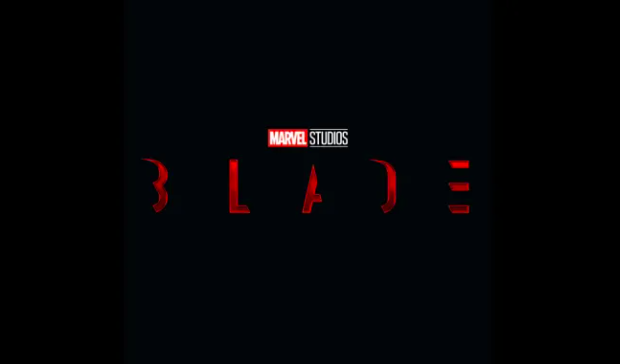 ‘Blade’ Removed From Disney Release Slate, Replaced w/ ‘Predator: Badlands’ In 2025
‘Blade’ Removed From Disney Release Slate, Replaced w/ ‘Predator: Badlands’ In 2025